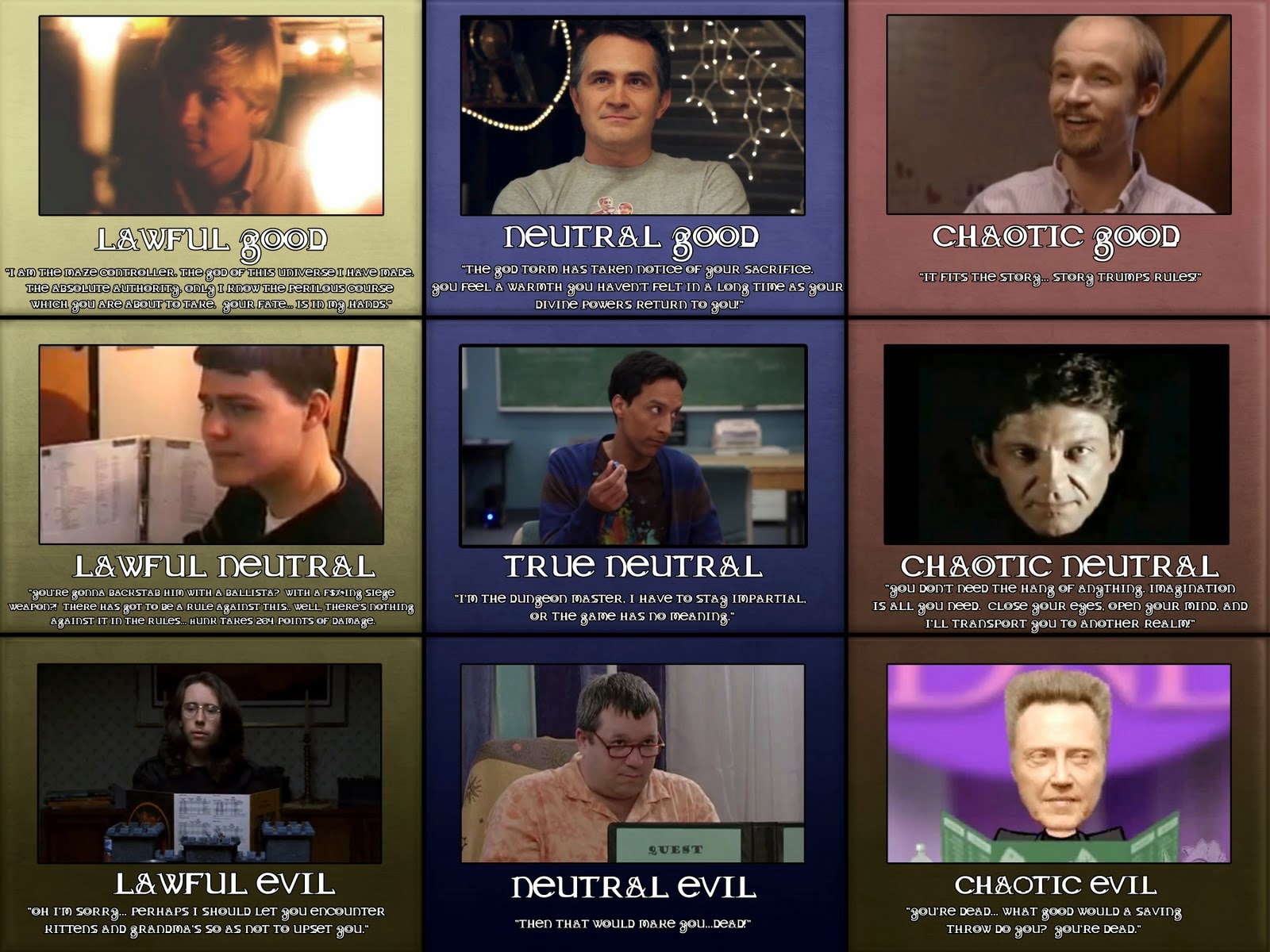We all know about DM alignments, right? A fairly common way to envision different DM types is by gauging where they fall on the Good-Evil / Lawful-Chaotic axes. But there is another way of understanding DMs, one which I have only begun to understand based on thinking pretty much everyone DMed the same way I did.
My last post on the quantum ogre, solved the notion in my mind by simply deferring to DM improvisation. However, even as I wrote those thoughts my mind turned to several conversations I have had with other DMs that admit they struggle with improvisation and on the fly DMing. Coming up with connections, relationships, hooks, depth, backstory, for them takes time and thought and careful planning. They do not just "make it up as they go along " but prefer to have things thought out ahead of time so that they have a well designed or planned outline, at least, for their players.
The thought of showing up with nothing prepared to a game scares these DMs to death. Or if it doesn't scare them then they simply scoff off such play as haphazard and poor. They would never dare to lower their game to such a random and ill thought out fate. There is of course nothing wrong with this. Well planned campaigns reflect an attention to detail, a sense of immersion and completeness that on the fly DMing can often lack. These DMs often go the trouble to carefully prep miniatures, landscape scenes, select cool artwork, prep background music, even incense or other sensory immersion details. They have carefully planned the motives of NPCs and how they are connected to other NPCs in the region. Their maps have a level of description and detail that would rival the best commercial modules. Such DMS are in my opinion some of the most artful and skilled DMs out there.
Not all of these types of DMs, but some, will admit that when things start to head outside the lines they feel the need to close down the session, so they can return to their lair and prep the next expansion of the adventure. They are uncomfortable working on the fly, and are often at a loss when players start to wander outside the lines of their carefully constructed plans. This is perhaps with the idea of the quantum ogre begins to seem appealing. Shifting preplanned encounters around to foil players efforts to wander off track can begin to tempt such DMs who are far less comfortable letting players challenge them to improvise.
For these types of DMs it may be that my solution to the quantum ogre is less than satisfying. They don't want to railroad players down a certain path; but what is a plan-oriented DM supposed to do when their long hard hours of planning an encounter go to waste when the session starts with the players deciding to go a totally different direction? In these cases I am much less apt to censure or to cast stones, largely because I have no idea what DMing like this regularly is like.
I plan of course, and often in great detail. But I developed as an improvisational DM in my youth. Every afternoon as we got off the school bus my friends and I would decide whether we wanted to get together and game. I never knew when it was coming. I recall long and winding escapades in and around the Keep on the Borderlands. Exactly because it was a sandboxy adventure it lent itself to improvising and a gaming as you go sort of style. There were other settings, many often created out of whole cloth at the table--but it worked, and it worked incredibly well. There were sessions I planned thoroughly, usually pre-planned overnighters where I knew we when and where we were gaming--so I could plan ahead. But more often than not it was an in the moment impromptu session thrown together in less than 15 minutes. I assume those early gaming experiences made me a lot of what I am now as a DM.
So I am not the best to give advice to those DMs that may not be as comfortable with that approach. The best I can say, is know your players. Know what they are likely to do, work closely with them before, during and after you plan the next session. And don't feel bad when things occasionally go off track. Take some time planning personal wandering monster and encounter charts for your undoubtedly well thought out geographies and environments. That will help you get through the session in a pinch until you can get home and work with the creative randomly generated fodder from the improvised session. And don't fret about quantum ogres or Schrodinger's cats. They will be where they will be, dead or alive when you and your players need them.

I'm a planner as a DM. I'm even a planner as a player. The Quantum Ogre concept is a great solution to being caught off-guard and is a great tool to have in your role-playing toolbox. But how do I translate that into my career?!
ReplyDelete